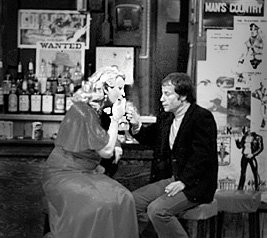|
Welcome to the Archive Version of the online On the Purple Circuit, which ran from 2000-2021. Bill Kaiser founded the Circuit as a newsletter in 1991, and, in 2000, Demian joined as co-editor. Demian programmed the site, expanded the scope of the Circuit, as well as retouched all the images. Demian needed to stop working on the Purple Circuit in order to realize his other projects, such as publishing the book “Operating Manual for Same-Sex Couples: Navigating the rules, rites & rights,” now available on Amazon, and to publishing his “Photo Stories by Demian” books based on his more than 6 decades as a photographer and writer. QueerWise and Michael Kearns have committed to offering a continuation of the Purple Circuit. The new Web address is purplecircuit.org. Bill Kaiser continues as editor and can be reached at purplecir@aol.com Bill and Demian express their appreciation for the hundreds of writers, directors, actors, and publicists who sent their articles and play data. They have toiled mightily to bring our gay, lesbian, trans, and feminist culture into public view, and appreciation. |
| Bill Kaiser, founder (1991), publisher, editor - purplecir@aol.com - 818-953-5096 Demian, associate editor (2000), Web builder, image retouch (since 2003) Contents © 2022, Purple Circuit, 921 N. Naomi St., Burbank, CA 91505 |
|
The West Street Gang by Doric Wilson June 16, 2000, revised June 1, 2007 |
To quote my play “An Object of Affection” (work-in-progress), “Gay male history is last week, but only if it was longer than eight inches.” The past is an ex-lover, to be avoided at all cost. We have no oral tradition (at least not in the “traditional” sense), we have no memory of what went before, and little respect for the brave few that fought to give us our present. There is a gentleman among us, who (writing under a “nom de closet”) has made his journalistic career outing celebrities, but, who, like most of our community, totally disdains (often with hostility) those individuals who openly and publicly contribute to our culture. In the mid-70s, I was standing in the Spike Bar, conversing with a bottle of Budweiser when a buddy walked in, his face bruised and bandaged. Seems he had been fag bashed by a street gang (a common neighborhood occurrence). He had staggered to the Eagle’s Nest bar which was holding a tea dance benefit for a national gay organization. Beaten and bloodied he explained to the female co-chair guarding the door that he had been attacked and needed to use the phone to call the police, she refused to allow him into the bar until he paid the contribution. “The West Street Gang” began to write itself in my mind. When the Spike first opened, I had been bartender/manager so there was no problem convincing the owners to let me stage the play there. We created a “bar set” where the DJ booth was later located, moved the pool table to make room for 100 seats and used the corner doors so the actors could actually enter the stage from West St. The night before the play’s first performance, I stood in the Spike, cruising the crowd when to my horror it occurred to me I was about to let my “art” invade the sanctum of my “sexuality” (surely Freud says the reverse is the preferred position.) The play opened and imagine my surprise when my innocent effort caused a great big brouhaha among the political guardians of “gay thought.” The review in Christopher Street magazine complained that I had maligned the poor policepersons. The National Gay Task Force dropped me from its membership list. Bar owner Jack Modica (not usually a champion of liberal causes), instituted a boycott (which the cast gleefully joined, hanging a poster behind the bar in the play reading: “The West Street Gang” supports the Eagle’s Nest boycott of “The West Street Gang.”) And then there was the performance when Village Voice journalist Arthur Bell (a target of the play’s satire) showed up, and the audience watched him watch the play. Leslie Magerman (who played Arthur Klang) was later overheard explaining to Arthur Bell: “I feel, as an actor, when I play the part of a ‘villain’ …” “The West Street Gang” was a success and ran for six months (A year later, the Glines revived it in repertory with “A Perfect Relationship.”) There was even a night in its honor at Studio 54 (the doorman almost didn’t let me in). Its effect as environmental theater was proved the afternoon a street gang intending to trash the Spike, opened the door only to be confronted by the cops from the play. My depiction of Arthur Bell made it to Liz Smith’s column, and Anne Miller (a victim of Bell’s acid attacks) sent me a dozen roses in gratitude. Anyone who saw the Spike production will always remember my beloved Billy Blackwell (Shanghai Lil) exiting from the men’s room in splendiferous scarlet drag, or the excellent Ivan Smith (Bill Bender) targeting his laugh lines with the ease of William Tell, or the incredibly talented Caroline Yeager (Anita Bryant) entering from West St. with her bag of oranges. We really don’t need Tom Cruise (in or out) we have our own celebrities. We just forget to remember them. |
